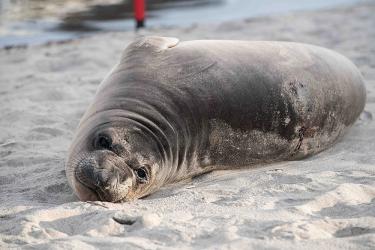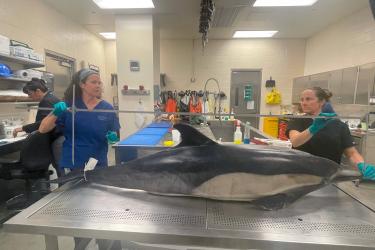What is NOAA Fisheries doing to provide more food for the whales?
NOAA Fisheries and our partners have been working for many years to provide more food for Southern Resident killer whales in several ways. These include restoring habitat to recover the salmon the whales depend on, increasing fish hatchery production that is consistent with the protection of wild fish, limiting boat traffic that disrupts the whales’ feeding, and reduced fishing pressure in important feeding areas such as the west side of San Juan Island.
Other actions go even further. For instance, the Pacific Salmon Commission recently agreed to recommend reductions in the harvest of Chinook salmon by up to 15 percent in Washington and Oregon, 12.5 percent in British Columbia, and 7.5 percent in Alaska to promote salmon recovery. Since Puget Sound Chinook salmon migrate through multiple boundaries, the international agreement will leave more fish in the water and available to the whales.
Won’t that take too long?
Harvest reductions and hatchery production increases can take place in short order, and the Washington Department of Fish and Wildlife estimates that reduced fishing and related vessel traffic mean that more fish are available to the whales in Puget Sound this year. Salmon habitat restoration takes longer to produce more fish but federal funding from the Pacific Coastal Salmon Recovery Fund, funds from non-profits such as the National Fish and Wildlife Foundation, and increased funding from Washington under the governor’s orca initiative are increasing the pace of restoration. Such restoration has been underway for decades and we are seeing results. For example, monitoring of one restoration project in the Skagit River estuary found that the habitat can now support thousands more Chinook salmon smolts.
The Washington Department of Fish and Wildlife and NOAA Fisheries developed a priority list of West Coast salmon stocks that are most important to Southern Resident killer whales. We are using this list to direct funds toward restoration projects that will improve those key Chinook salmon stocks that will make the greatest difference for the whales. We need everyone’s help to accelerate habitat restoration to provide sustainable increases in fish numbers that will move both salmon and the Southern Resident killer whales toward recovery.
Why not feed the whales directly?
Research and experience shows that feeding wild animals can unintentionally reduce their chance of survival in the wild. Human handouts of food lead wildlife to become habituated to artificial food sources and to lose their natural wariness of humans, as well as their instinct to hunt for themselves. Studies have found that habituated animals that become dependent on human feeding do not subsequently survive as well in the wild (see scientific references at the end of this document). These changed behaviors may be passed on to young and other members of a social group, increasing their risk of injury from boats and entanglement in fishing gear. At this point, it is critical that Southern Resident killer whales retain their natural hunting behavior so they can take advantage of increasing salmon returns as other recovery efforts take hold.
While harvest reductions and hatcheries also deliver more food for the whales, they do so in a way that does not compromise the whales’ natural behavior and instincts.
Then why did NOAA Fisheries try to feed J50 during intervention efforts in 2018?
The trials conducted with J50 in 2018 were designed specifically to test whether live salmon could be used to provide a specific medication that must be delivered orally to be effective. The trial was not an effort to feed J50 or other Southern Resident killer whales. The trial was not successful. There was no indication that J50 responded to the release of salmon directly in front of her, as documented by aerial video from a permitted drone that observed the trial.
What do the laws say about feeding wildlife?
Southern Resident killer whales are protected by the Endangered Species Act (ESA) and Marine Mammal Protection Act (MMPA). Both acts prohibit actions such as human feeding of animals that disrupt their natural behavior and reduces their chances of survival in the wild.
In 1991, NOAA Fisheries amended the prohibitions under the MMPA to specifically include “feeding or attempting to feed a marine mammal in the wild.” The law defines feeding as “offering, giving, or attempting to give food or non-food items to marine mammals in the wild,” including “operating a vessel or providing other platforms from which feeding is conducted or supported.” In 1994, Congress amended the language of the MMPA, specifically listing feeding as a form of harassment that “has the potential to disturb a marine mammal or marine mammal stock in the wild by causing disruption of behavioral patterns.”
NOAA Fisheries’ Office of Law Enforcement works closely with other federal and state law enforcement agencies to enforce federal regulations and investigate violations.
If prosecuted, violators of the MMPA could face:
- Civil penalties up to $11,000.
- Up to 1 year in prison, plus criminal fines.
- Forfeiture of the vessel involved, including penalties for that vessel up to $25,000.
I saw someone feeding a marine mammal. How can I report a complaint?
NOAA Fisheries’ Office of Law Enforcement (OLE) takes reports of violations of the MMPA and the ESA. You may call OLE’s national hotline at 1-800-853-1964 (information may be left anonymously). You may also report the violation online at http://www.bewhalewise.org under the Report Violations tab.
Please share any evidence you have with OLE of the violation. Photos, video, and detailed information is helpful.
For more information on how to contact OLE, please visit our Report a Violation page.
I think a marine mammal is injured or entangled. What should I do?
If an animal is injured or stranded please call the West Coast Marine Mammal Stranding Network hotline at 1-866-767-6114. Please take photos and provide detailed information (exact location, description of the injury or situation, species, etc.) to the Network group when they return your call.
To report an entangled marine mammal, please call NOAA Fisheries entanglement hotline at 1-877-SOS-WHALe (1-877-767-9425).
For more information, visit our West Coast Large Whale Entanglement Response Program webpage.
What research shows that feeding wildlife jeopardizes their survival?
Scientific research papers on the topic of feeding marine wildlife include:
- Christiansen, F., McHugh, K. A., Bejder, L., Siegal, E. M., Lusseau, D., McCabe, E. B., … Wells, R. S. (2016). Food provisioning increases the risk of injury in a long-lived marine top predator. Royal Society open science, 3(12), 160560. doi:10.1098/rsos.160560
- Cunningham-Smith, P., D. E. Colbert, R. S. Wells, and T. Speakman. 2006. Evaluation of human interactions with a provisioned wild bottlenose dolphin (Tursiops truncatus) near Sarasota Bay, Florida, and efforts to curtail the interactions. Aquat. Mamm. 32(3): 346–35.
- Finn, H., R. Donaldson, and M. Calver. 2008. Feeding flipper: a case study of a human-dolphin interaction. Pac. Conserv. Biol. 14: 215–225.
- Gaydos, J.K., Vilchis, L.I., Lance, M.M., Jeffries, S.J., Thomas, A., Greenwood, V., Harner, P., and Ziccardi, M.H. 2013. Postrelease movement of rehabilitated harbor seal (Phoca vitulina richardii) pups compared with cohort-matched wild seal pups. Marine Mammal Science. 29(3): E282-E294.
- Mann, J. and C. Kemps. The effects of provisioning on maternal care in wild bottlenose dolphins, Shark Bay, Western Australia. In Marine mammals: fisheries, tourism, and management issues (N. Gales, M. Hindell, and R. Kirkwood, eds.), p. 304–317. CSIRO Publishing, Collingwood, Victoria.
- National Marine Fisheries Service. 1994. Report to Congress on results of feeding wild dolphins: 1989–1994. National Marine Fisheries Service, Office of Protected Resources, 23 p.
- Orams, M. B. 2002. Feeding wildlife as a tourism attraction: a review of issues and impacts. Tourism Manage. 23: 281–293.
- Samuels, A., and L. Bejder. 2004. Chronic interaction between humans and free-ranging bottlenose dolphins near Panama City Beach, Florida, USA. J. Cetac. Res. Manage. 6(1): 69–77.
- Senigaglia, V., F. Christiansen, K. R. Sprogis, J. Symons, and L. Bejder. 2019. Food-provisioning negatively affects calf survival and female reproductive success in bottlenose dolphins. Scientific Reports, volume 9, Article number: 8981.

